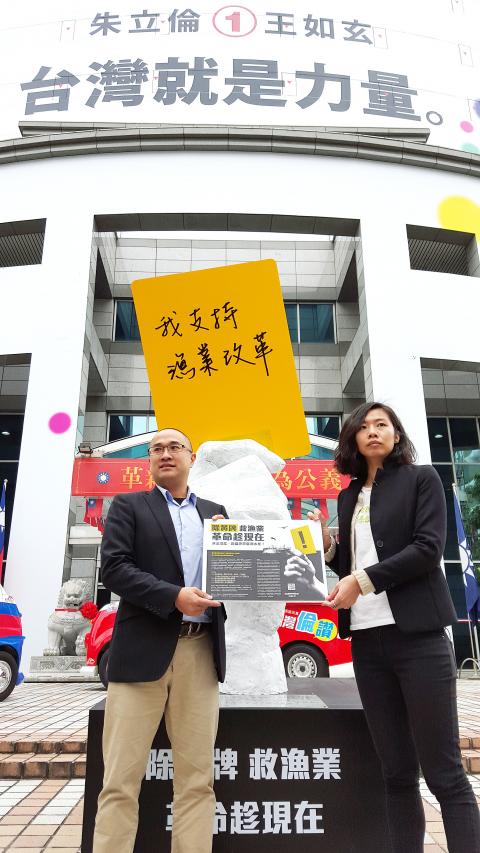Greenpeace Taiwan yesterday erected a sculpture of a hand holding a yellow card in front of the Democratic Progressive Party (DPP) and the Chinese Nationalist Party (KMT) headquarters in Taipei, urging the two parties to address fisheries policy after Taiwan was given a yellow card warning over illegal fishing activities in September.
The European Commission in October identified Taiwan as an uncooperative nation in the fight against illegal fishing after a Taiwanese ship was found to have broken a shark-fin harvest law in waters near Papua New Guinea.
Taiwan’s aquatic products could be banned in EU markets if the nation is not able to resolve the issue in six months.

Photo: Chen Wei-han, Taipei Times
Greenpeace Taiwan said that policies tabled by the two parties did not address illegal fishing, distant fishing management or remedy measures in response to the yellow card warning, with the KMT’s platform leaning toward tourism and the DPP’s toward offshore energy and marine current power development.
The organization called on the parties to revise the Fisheries Act (漁業法) to clamp down on illegal, unreported and unregulated fishing, establish a traceability system for aquatic products and ensure information transparency.
The organization’s ocean campaigner Lisa Tsai (蔡佩芸) said: “We have not seen any specific policy design on fisheries resources management on a national scale despite the two parties’ and the Fisheries Agency’s repeated pledges to do so. That is why we are here today, to urge them to honor their pledge.”
DPP official Yang Chang-chen (楊長鎮) said that the party supports the reformation of the fishing industry and would move to synchronizing national regulations with international standards, as well as enacting soft laws.
KMT official Huang Po-chung (黃柏均) said that the KMT accepts the group’s demands and the party also proposed to set up an environmentally friendly fishing fleet at each of the nation’s fishing villages to protect fishery resources and human rights.
Fisheries Agency Deputy Director Huang Hung-yan (黃鴻燕) said the agency is revising the act in accordance with the EU standards by substantially raising the fine limit for illegal fishing, and it would submit the draft amendment to the Legislative Yuan for review in the next legislative session in February.

Alain Robert, known as the "French Spider-Man," praised Alex Honnold as exceptionally well-prepared after the US climber completed a free solo ascent of Taipei 101 yesterday. Robert said Honnold's ascent of the 508m-tall skyscraper in just more than one-and-a-half hours without using safety ropes or equipment was a remarkable achievement. "This is my life," he said in an interview conducted in French, adding that he liked the feeling of being "on the edge of danger." The 63-year-old Frenchman climbed Taipei 101 using ropes in December 2004, taking about four hours to reach the top. On a one-to-10 scale of difficulty, Robert said Taipei 101

Nipah virus infection is to be officially listed as a category 5 notifiable infectious disease in Taiwan in March, while clinical treatment guidelines are being formulated, the Centers for Disease Control (CDC) said yesterday. With Nipah infections being reported in other countries and considering its relatively high fatality rate, the centers on Jan. 16 announced that it would be listed as a notifiable infectious disease to bolster the nation’s systematic early warning system and increase public awareness, the CDC said. Bangladesh reported four fatal cases last year in separate districts, with three linked to raw date palm sap consumption, CDC Epidemic Intelligence

Two Taiwanese prosecutors were questioned by Chinese security personnel at their hotel during a trip to China’s Henan Province this month, the Mainland Affairs Council (MAC) said yesterday. The officers had personal information on the prosecutors, including “when they were assigned to their posts, their work locations and job titles,” MAC Deputy Minister and spokesman Liang Wen-chieh (梁文傑) said. On top of asking about their agencies and positions, the officers also questioned the prosecutors about the Cross-Strait Joint Crime-Fighting and Judicial Mutual Assistance Agreement, a pact that serves as the framework for Taiwan-China cooperation on combating crime and providing judicial assistance, Liang

US climber Alex Honnold left Taiwan this morning a day after completing a free-solo ascent of Taipei 101, a feat that drew cheers from onlookers and gained widespread international attention. Honnold yesterday scaled the 101-story skyscraper without a rope or safety harness. The climb — the highest urban free-solo ascent ever attempted — took just more than 90 minutes and was streamed live on Netflix. It was covered by major international news outlets including CNN, the New York Times, the Guardian and the Wall Street Journal. As Honnold prepared to leave Taiwan today, he attracted a crowd when he and his wife, Sanni,